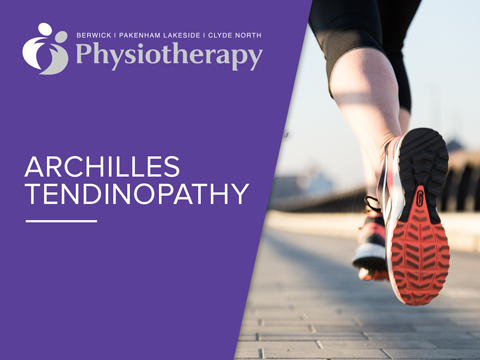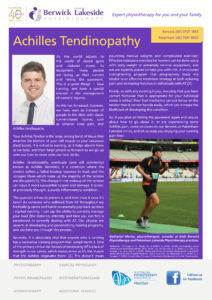ACHILLES PAIN STOPPING YOU EXERCISING? Started really increasing your running load during this time of COVID-19 shutdown, but have been plagued by an unusual pain in the back of your lower leg? You are not alone!…Click here to find out more…
As the world adjusts to this world of closed gyms and reduced access to equipment, many people are lacing up their runners and hitting the pavement. This is a great thing! I love running, and have a special interest in the management of runners’ injuries.
As this has increased, however, we have seen an increase of people in the clinic with classic runners-based injuries, such as anterior knee pain, and Achilles tendiopathy.
Your Achilles Tendon is the large, strong band of tissue that attaches the bottom of your calf muscle to your calcaneus (heel bone). It is critical in running, as it helps absorb force as we land, and then helps propel us forward as we go up onto our toes to move onto our next stride.
Achilles Tendinopathy, previously (and still commonly) known as Achilles Tendinitis, is a condition where the tendon suffers a failed healing response to load, and the collagen fibres which make up the majority of the tendon are disrupted [1]. This change in the makeup of the tendon can leave it more susceptible to pain and damage. It is not, as previously thought, a purely inflammatory condition.
The question is how to prevent it, and then treat it once it’s here? As someone who suffered from AT throughout my footballing career and had it occasionally pop back up since I started running, I can say the ability to correctly manage your load (the distance, intensity and time you run for) is paramount in correctly dealing with AT. Our physios are experts at developing and personalising loading programs, and can help you through this process.
Secondly, it is absolutely vital that anyone who is running has a resistance training program that compliments it. One of the primary clinical risk factors of developing AT is a lack of strength in our calves, which makes sense as it’s the muscle that the Achilles originates from! [2] This doesn’t mean pounding massive weights and complicated exercises! Effective resistance exercises for runners can be done easily with body weight or extremely minimal equipment, and we are expertly placed to help you with this. A structured strengthening program that progressively loads the tendon is an effective treatment strategy at both reducing pain and increasing function in individuals with AT [3].
Finally, as with any running injury, ensuring that you have correct footwear that is appropriate for your individual needs is critical. Poor foot mechanics can put forces on the tendon that it cannot handle easily, which can increase the likelihood of developing the condition.
So, if you plan on hitting the pavement again and unsure about how to go about it, or are experiencing some Achilles pain, come on down to our Berwick or Pakenham Lakeside clinics, and let us keep you enjoying your running pain-free!


